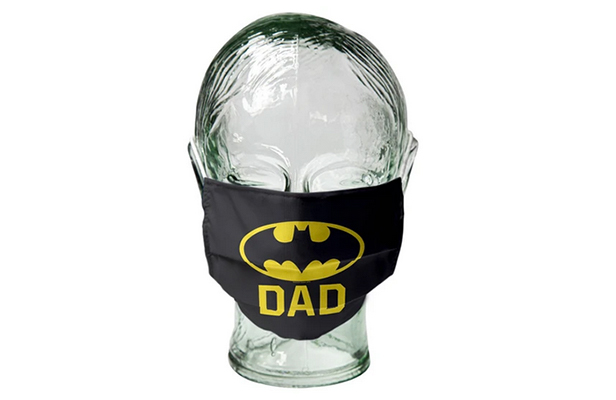April 23, 2020
Demand for Branded Masks Could Soar
That presents potential big opportunities and ethical quandaries for promotional products professionals.
Demand for branded face masks is poised to rise dramatically in the months ahead.
For the promotional products industry, that presents both opportunity and potential ethical dilemmas.

Batman Bat Dad face mask available from MaskClub.
Evidence is mounting that face masks/coverings are moving beyond “just” being practical tools for slowing the spread of COVID-19 and also becoming accessories for making personal statements.
Musical acts and professional sports teams, including all clubs in the National Basketball Association (NBA), are selling branded masks. Admirably, sales will benefit various charities and initiatives aimed at fighting the novel coronavirus.
Meanwhile, masks as statement pieces are also starting to proliferate at retail.
Vanessa Friedman, The New York Times’ fashion director and chief fashion critic, explored the phenomenon in a piece published April 22.
We've been talking for awhile about how the fashion system might change, post-pandemic. I have an idea about where it should start now. For this item, at least: price transparency. https://t.co/GNWKHKAxRE
— Vanessa Friedman (@VVFriedman) April 23, 2020
Friedman notes the existence of entities like MaskClub.com, which is selling masks decorated with graphics that include everything from superhero symbols and cartoon characters, to American flags, tie-dye patterns and more. For each mask purchased, MaskClub donates a mask.
Then there are masks that fall in the fashion realm, such as those available from Stacy Bendet of Alice + Olivia, which come in floral and animal prints. Meanwhile, fashion brand Collina Strada is making masks from deadstock, decorating them with bows. The Collina Strada masks are going for $100 each.
“Now that countries like Morocco, Austria and the Czech Republic, and states including New York, New Jersey and Maryland, have mandated masks in public areas where social distancing is not possible, the burgeoning industry is only going to get bigger,” Friedman writes.
I totally agree. And that has implications for promo – namely, that demand for logoed masks from end-clients is likely to increase in the weeks and months ahead.
For one thing, promo’s corporate customers often look to mimic what’s happening at retail. And, as noted above, retail is turning masks into graphic-infused, statement-making accessories.
NBA Face Coverings now available. All NBA proceeds from the sale of licensed face coverings will be donated to @FeedingAmerica and @SecondHarvestCA.
— NBA Store (@NBASTORE) April 17, 2020
NBA Store: https://t.co/1E0yzxDaDM
WNBA Store: https://t.co/sDECwbZV9d pic.twitter.com/3VLPAWPR3W
Furthermore, there will be a growing practical need for masks as coronavirus-related lockdown measures are loosened. Even as society begins to reopen, we won’t be in an “all-clear” from a health perspective. Wearing masks at work and in public is likely to remain a mandate and/or recommended practice from health authorities for some time to come.
As such, companies and other organizations are going to need masks to help keep workers safe. Some will also want to support their communities or various causes by donating masks – and, quite frankly, to have it publicized that they were offering such support.
More promo end-clients are going to want to take the extra step of putting their logos and/or related messaging on the masks. Not to sound insensitive to the public health catastrophe that’s driving the need for the masks, but the reality is that they make a potentially very effective promotional product: They must be worn constantly in public and they situate on a wearer’s face where they can’t be missed by onlookers.
Theresa Hegel, ASI’s executive director of digital content, noted that the interest in embellished masks is already starting to rise. She learned that through recent discussions with distributors and apparel decorators. “In terms of decoration, they say they’re screen printing, sublimating, laser-etching, heat-pressing small leather patches or even adding rhinestones to face masks,” Hegel says. “There are a lot of possibilities.”
For sure, some promo distributors, such as Denver, CO-based AMB3ER (asi/590243), are already taking initiative with branded masks, as CEO Jeremy Picker showed in a recent tweet:
Working on some masks for my employees & to gift clients. I think the Bacon is my fav! 🥓 #wegotthisdenver #masks #bacon #pantone pic.twitter.com/LPD5n1jXBI
— Jeremy Picker (@JWPicker) April 23, 2020
Nonetheless, for some, branded mask sales raise the specter of possible ethical issues. Some might feel there’s something dubious about selling branded masks – that profiting off the worst pandemic the United States has experienced in more than 100 years is wrong.
Looked at in those abstract terms, it can feel unethical. However, before cementing that as a conclusion on the topic, consider certain specifics:
- A legitimate public health need is served by providing the masks.
- Companies that may be trying desperately to recover amid the coronavirus-imploded economy could benefit from the visibility branded masks will help provide.
- Distributors and suppliers can add charitable components to their sales of branded masks, pledging to donate a portion of profits form the sales to support initiatives aimed at combatting COVID-19.
- Sales of traditional promotional products have been utterly devastated by the pandemic, putting certain industry companies on the brink of collapse. Having a sought-after product to sell – a product that does a service to public health and that could help produce real ROI for clients – could help return some life to ailing promo firms. If you add in a charitable thrust and, of course, sell the items at fair market rate, then you’re not “profiteering” on a pandemic; you’re contributing to solutions – for clients, for society and for your own business.
